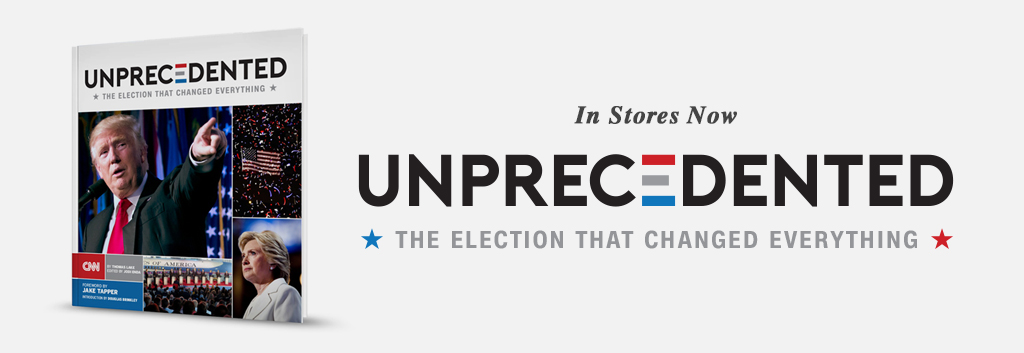One morning in February, Joel Searby decided that someone had to do something. He decided that someone might as well be him. And so he began searching for a third-party candidate who would be more Republican than the leading Republican.
Yes, it had come to this. Searby, a political strategist in Florida, spent his days in the winter and spring researching independent candidacies and the people who might be amenable. He kept getting the same answer. Various members of Congress: no. Radio host Dave Ramsey: no. Dwayne "The Rock" Johnson: no. Former Secretary of State Condoleezza Rice? "The answer was no, and then no again, and then ultimately 'Hell, no!'" Later, Searby joined forces with other Republican operatives and the conservative leader Bill Kristol. The recruitment continued. Retired Marine Gen. James "Mad Dog" Mattis: no. Sen. Ben Sasse of Nebraska: no. Former nominee Mitt Romney: no. No one wanted to be accused of splitting the Republican vote and thereby helping elect another President Clinton.
On May 29, Kristol gave the dwindling #NeverTrump faction a ray of hope. As he waited to board a flight to Israel, he tweeted, "Just a heads up over this holiday weekend: There will be an independent candidate—an impressive one, with a strong team and a real chance." His candidate had a Harvard Law degree, a Bronze Star for service in Iraq as a legal advocate in the Army Reserve and, as it turned out, a name that few voters had ever heard. David French for president? No, not even. French, a writer and attorney in Tennessee, admitted he had neither the money nor the political talent for this challenge. As he later said on MSNBC, someone made an intimidating phone call to his house. Racists on the Internet mocked the daughter he and his wife had adopted from Ethiopia. And French decided not to run.
Once again, establishment Republicans found themselves in a place they could not have imagined. They were a party without a candidate.

Ten months earlier, they had looked so strong. Their contenders included successful governors, charismatic young senators (who also happened to be Hispanic), a business executive (who also happened to be a woman) and a famous neurosurgeon (who also happened to be African-American). Republican leaders called it the party's deepest field in decades. But of the seventeen Republicans running for president, one was not like the others. He changed parties like he changed his shoes, going from Republican to Independence Party to Democrat to Republican to having no party affiliation before claiming once again to be a Republican. Who was Trump, and where was his allegiance? At the first debate on August 6, he gave an unequivocal answer. Bret Baier of Fox News asked the candidates to raise their hands if they would not pledge to support the eventual Republican nominee, if they would not rule out running as an independent. Only one hand went up, and that hand belonged to Trump.
"If I'm the nominee," he said, "I will pledge I will not run as an independent. But—and I am discussing it with everybody, but I'm, you know, talking about a lot of leverage."
There was no mystery here, no attempt to hide the truth. This was a political carjacking.
The Republican front-runner had just told everyone he was using the party for his own ends. He would drive their car as long as it suited him. And then, whenever he so desired, he would jump out and send it over a cliff.
But the Republicans did not perceive this existential threat until it was too late. Even if they had tried to force him out somehow, it probably would not have worked. According to the Republican National Committee's chief strategist, Sean Spicer, criticizing Trump only increased his appeal with the disgruntled electorate. To those who said the party should have found a way to stop him, Spicer had this reply: "I think for people to say that is like looking at a guy in the pool and saying, 'Well, if you just swam faster, you would have beat Michael Phelps.' No shit."
Anyway, Trump was talking about a lot of leverage. He loved talking about leverage. In his 1987 book "The Art of the Deal," he wrote, "The worst thing you can possibly do in a deal is seem desperate to make it. That makes the other guy smell blood, and then you're dead. The best thing you can do is deal from strength, and leverage is the biggest strength you can have."
Did the Republicans want him as their front-runner or as their third-party competitor? Trump had the leverage to make them choose. Donors threatened to stop giving to the RNC if a major candidate wouldn't pledge to support the eventual nominee. Other candidates wondered why they had to sign loyalty pledges in exchange for RNC voter data if Trump wasn't going to sign one. Pressure mounted on Spicer and his colleagues to get a deal done. Spicer negotiated for weeks with Trump's first campaign manager, Corey Lewandowski. Finally, on September 3, Spicer and RNC Chairman Reince Priebus delivered the loyalty pledge to Trump Tower. Trump signed it. Spicer and Priebus quietly left the building. Trump went down to the lobby and trumpeted the news.
"The best way for the Republicans to win is if I win the nomination and go directly against whoever (the Democrats) happen to put up," he said. "And for that reason, I have signed the pledge."
For the moment, it looked as if the Republicans had won. They'd made Trump fall in line. They thought he'd be gone by Christmas. They were wrong.
All sixteen of his competitors signed the pledge as well. Only later did the consequences become clear: In binding Trump to the party, they had bound themselves to Trump.
✦ ✦ ✦

What gave Trump his leverage—what left the party vulnerable to hostile takeover—was an anti-establishment fury that eventually turned the Republicans against themselves. It began shortly after Barack Obama won the presidency in 2008, and continued with Sen. Mitch McConnell's resolution to do all in his power to make Obama a one-term president, and flared more brightly with the anti-Obama tea party movement, and began causing collateral damage shortly after that. One after another, Republicans won House and Senate seats on promises to stop Obama at all costs. They voted more than sixty times to repeal all or part of his Affordable Care Act, but these symbolic gestures only reinforced the notion that they couldn't get anything done. Pretty soon you had Republicans (such as Ted Cruz) building careers on defying other Republicans (such as McConnell) for their failure to stop Obama. They were like a team that loses five in a row and tries to fix everything with a chair-throwing brawl in the locker room.
Most Republican voters didn't like Obama any more than their party leaders did. They thought he had telegraphed his disdain for white working-class Americans in 2008 with his comment about them becoming bitter and clinging to guns and religion, and their frustration with him increased every time he went on television to preach about gun control or warn against religious intolerance. Some believed he was a Muslim. Some hated having a black president. And some were tired of hearing a former law professor talk down to them. Party leaders saw a growing coalition of voters with one thing in common.

Unprecedented 2016
S.E.
Cupp
Trump: 'She's so tough on me'
"They made a decision to go out and attract voters to the party who had one redeeming characteristic, and that was a consistent anti-Democratic Party view and a hatred, in particular, a hatred of Barack Obama," said Tony Fratto, a former aide to George W. Bush. "The attraction was not whether they shared our views on trade or long-term entitlement spending or design of a health care system or views on education policy. None of that mattered at all. The only thing that mattered was, do they hate Barack Obama? Are they anti-Democratic Party? Are they reliable votes? And if they are those things, then we want them in the party."
The contempt for Obama was inescapable. There was Rep. Joe Wilson of South Carolina, yelling "You lie!" during Obama's second speech to Congress. There was Arizona Gov. Jan Brewer, pointing a finger in his face. There was Trump in 2011, demanding to see his birth certificate. There was Romney in 2012, seeking and receiving Trump's endorsement.
"Being in Donald Trump's magnificent hotel and having his endorsement is a delight," Romney said, four years before declaring him a "phony" and a "fraud" in a futile attempt to stop him from winning the nomination. That was the problem for Republicans who tried to delegitimize Trump in 2016. Some had accepted his endorsement. Some had accepted his campaign contributions. Through words and actions, many had signaled their approval.

By August 2015, Trump already had demeaned John McCain and Megyn Kelly and Mexican immigrants, among others. Was this beyond the pale? Did this disqualify him from bearing the Republican standard? Apparently not. Shortly after the first debate, Wisconsin Gov. Scott Walker said, "Any of the people on that stage where I was standing would be infinitely better than Hillary Clinton as the next president of the United States." In December, standing by Trump at another debate, Cruz said, "What I can tell you is all nine of the people here would make an infinitely better commander in chief than Barack Obama or Hillary Clinton." At yet another debate with Trump in January, Jeb Bush said, "Everybody on this stage is better than Hillary Clinton."
The party unwittingly helped Trump in other ways, too. After a bruising primary cycle in 2012, the RNC cut the number of debates from twenty-seven to twelve—thus giving Trump's challengers less time to take back the spotlight. The 2016 primary schedule and delegate-allocation rules were designed to help the front-runner lock up the nomination quickly, and they did just that for Trump.
As he marched through the primaries, many in the Republican establishment began working against him. "Looking back," Sen. Lindsey Graham of South Carolina told CNN's Wolf Blitzer on March 7, "we should have basically kicked him out of the party." A few days earlier, more than 120 foreign-policy and national-security experts signed an open letter declaring that Trump would "make America less safe" and "diminish our standing in the world." Romney chimed in: "His promises are as worthless as a degree from Trump University. He's playing members of the American public for suckers. He gets a free ride to the White House, and all we get is a lousy hat."
At the Fox News debate in Detroit on March 3, Brett Baier posed a gut-wrenching question to Marco Rubio, John Kasich and Ted Cruz: "Tonight, in thirty seconds, can you definitively say you will support the Republican nominee, even if that nominee is Donald J. Trump?"

Unprecedented 2016
Jeremy
Diamond
'Follow that car!'
Questions like this one had loomed over the entire race. Was Trump really a Republican? Did he stand for the things Republicans stood for? Did the other candidates owe him anything? Hours earlier, Trump had threatened again to run as an independent. Now his last three opponents had one more chance to disavow him.
"I'll support Donald if he's the Republican nominee," Rubio said.
"Yes," Cruz said, "because I gave my word that I would."
"Yeah," Kasich said, because a deal was a deal.
Trump forced the Republicans into a quandary. If you pledged to support someone, what would it take to negate that pledge? Which was worse: Breaking your word, or defending someone you found indefensible? There was no simple answer. It turned out Kasich would not support Trump. Others also would withhold endorsements. In May, after Cruz and Kasich dropped out and Trump became the presumptive nominee, Jeb Bush wrote on Facebook, "Donald Trump has not demonstrated that temperament or strength of character. He has not displayed a respect for the Constitution. And, he is not a consistent conservative. These are all reasons why I cannot support his candidacy."
Would Trump have supported the nominee had it been someone else? No one knew. But he believed his hostile takeover had earned him some loyalty—even from the Republicans he kept insulting.
"A pledge means something," Trump said at a rally after Bush's announcement. "Jeb Bush, a very low-energy individual, signed the pledge. While he was signing it, he fell asleep, so maybe that's his excuse."
Some Republicans criticized Priebus, the RNC chairman, for declaring Trump the presumptive nominee after Cruz dropped out on May 3. (Technically, Kasich was still in the race; he would drop out the next day.) But Mike Shields, a former RNC chief of staff and a CNN contributor, defended Priebus for upholding the will of the voters.
"The chairman's job is to defend the party. It is not to pick and choose who's qualified for the voters to talk to once the nominating process starts," he said. "I can't tell you how many times people would criticize him, go after him and say, 'You've got to do something about this, fix it, just do something.'...If Trump loses, he will have lost on his own. He won't have lost because the party bosses killed him, because the party didn't help him, because the party disrespected his voters. There's a message there for the Trump voters going forward. The Republican Party didn't say, 'We don't want anything to do with you.'"
✦ ✦ ✦

By late May, the nation's highest-ranking Republican had not yet endorsed the presumptive nominee. House Speaker Paul Ryan felt pressure from both sides of the party, especially from other House Republicans who thought his ambivalence toward Trump could hurt their own chances for re-election in November. At a meeting of Republicans in Florida, Ryan pulled a confidante, Tom Davis, into a corner and asked him what he thought. "I said, 'You've got no choice,' " the former Virginia congressman recalled. "'You've got to protect your members. If you weren't speaker, you'd have more leeway. But you're the lead elected (Republican) official in the country. If you break from this, it's a deluge. You won't get re-elected speaker in all likelihood. You'll get thrown under the bus. The party splits.'"
Maybe it already had. After Romney's defeat in 2012, Republicans commissioned an extensive self-study that became known as the Autopsy Report. It concluded that the party had done a bad job of appealing to women, minorities and young voters. It said Republicans should embrace comprehensive immigration reform in an attempt to win over crucial Hispanic voters. "If Hispanic Americans perceive that a GOP nominee or candidate does not want them in the United States (i.e. self-deportation), they will not pay attention to our next sentence," the report said. "It does not matter what we say about education, jobs or the economy; if Hispanics think we do not want them here, they will close their ears to our policies."

Now they had a presumptive nominee whose entire campaign was a rejection of that report. Trump's idea of comprehensive immigration reform was a border wall and a Muslim ban. What was Ryan to do?
"It's no secret that he and I have our differences," Ryan wrote in his hometown newspaper, The Janesville (Wisconsin) Gazette, on June 2. "I won't pretend otherwise. And when I feel the need to, I'll continue to speak my mind. But the reality is, on the issues that make up our agenda, we have more common ground than disagreement."
This tepid endorsement did not unify the party. A few days later at Romney's annual ideas summit in Park City, Utah, donors and executives aggressively questioned Ryan about his decision to endorse. Foreign-policy leaders despaired. Establishment figures worried that Trump would drive away women, Hispanics and younger voters for generations to come.
The cycle had begun with such promise. The Republicans had a large, talented pool of candidates vying to run against a beatable Democrat. Now some Republicans looked toward a very different best-case scenario. It sounded desperate, maybe even crazy, but to them it felt like the only way to save the party. They hoped their own candidate would lose in November. And they hoped it wouldn't be close.






